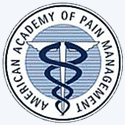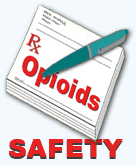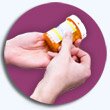Quick Reference
Partners for
Opioid Safety
Opioids911-Safety is
recommended by...

American Academy of
Pain Management
![]()
American Association
for the Treatment of
Opioid Dependence

American Chronic Pain
Association
![]()
American College of
Apothecaries
![]()
American Society for
Pain Management
Nursing
![]()
National Association
of Drug Diversion
Investigators

National Fibromyalgia
& Chronic Pain
Association
![]()
National Fibromyalgia
Association

Reflex Sympathetic
Dystrophy Syndrome
Association

The Foundation for
Peripheral Neuropathy

TNA-The Facial Pain
Association
Certifications
We comply with the
HONcode Standard
for trustworthy health
information.
![]()
Verify Here
WMA Certified

Verify Here
Opioids911-Safety has been independently developed with support provided in part by educational grants from...
Purdue Pharma L.P.
Opioids911-Safety (Opioids911.org) is an independent, noncommercial, Internet-based educational activity from Pain Treatment Topics for patients and their caregivers focusing on the proper and safe use of opioid pain relievers. Our mission is to provide an understanding of opioid analgesics and their various risks, and to suggest specific actions for preventing opioid-related problems, including: misuse, abuse, addiction, withdrawal, diversion, adverse reactions, overmedication, and life-threatening overdose. Instruction is provided on recognizing opioid problems if they do occur and on being prepared for what to do during an emergency.
If you think you have an opioid emergency, <click here>.
Why is opioid safety so important?
 Opioids (oh'-pee-oyds) are effective pain relievers. Sometimes these drugs are called "narcotics". However, "opioids" is the correct term for pain-relieving medicines that come from the opium poppy plant, such as codeine and morphine. Some opioids are made from chemicals that act like opium, such as oxycodone and others.
Opioids (oh'-pee-oyds) are effective pain relievers. Sometimes these drugs are called "narcotics". However, "opioids" is the correct term for pain-relieving medicines that come from the opium poppy plant, such as codeine and morphine. Some opioids are made from chemicals that act like opium, such as oxycodone and others.
There are various kinds of opioid medicines prescribed for different types of pain. All of these work best only when used properly and safely, exactly as directed by your healthcare provider; either the opioid prescriber or pharmacist.
Who is an opioid prescriber? Most physicians (MDs or DOs) and dentists may prescribe opioids for pain relief. In many states, nurse practitioners, physician assistants, and certain pharmacists also may prescribe opioid pain relievers.
As with other strong medicines, there are certain risks with opioids. Every year some patients and other persons, including children, are seriously harmed or die from opioid pain relievers.
The Opioids911.org website will help you to learn about and take more responsibility for opioid safety. Helpful information provides an understanding of what opioid medicines are and their risks, including side effects, abuse or addiction, and serious overdose. You also can learn how to reduce opioid risks, how to recognize problems if they do occur, and what to do in an emergency.
REMEMBER: Opioid Safety Needs YOU!
8 Very Important Safety Tips
- Never take an opioid pain reliever unless it is prescribed for you.
- Always take opioids as directed. Do not take more opioid or take it more often than is prescribed for you.
- Do not use opioids with alcohol or other drugs unless approved by your prescriber.
- Never break, chew, crush, dissolve, or inject your opioid medicine. If you cannot swallow it whole, talk to your prescriber.
- Protect and lock up your opioids in a safe place at all times, and properly dispose of leftover medicine.
- Never share opioids with another person, it is illegal and very dangerous.
- Be prepared for opioid emergencies. Know signs of trouble and what to do.
- Always read instructions that come with your opioid prescription. Contact your prescriber or pharmacist with any questions.
Click on the topic section or question of interest below...
1. What are opioids?
 Why are opioid medicines prescribed?
Why are opioid medicines prescribed?- How do opioid medicines work?
- What are the different kinds of opioids?
- What opioids are commonly prescribed?
2. What are safety concerns with opioids?
 How should I take my opioid pain relievers?
How should I take my opioid pain relievers?- How can opioids be harmful?
- What should I know and do about side effects?
- Could I become addicted to opioids?
- What is an opioid treatment agreement?
- What opioid prescribing restrictions should I know about?
3. How can I prevent problems with opioids?
 What opioid problems should I be prepared for?
What opioid problems should I be prepared for?- How can opioid problems be avoided?
- How can I keep track of my opioid medicines?
- What should I do to keep my opioids safe?
- How can I dispose of unused opioid medicine?
- What should I do if my opioids are lost or missing?
4. What should be done in an emergency?
 How can an opioid emergency be recognized?
How can an opioid emergency be recognized?- What are the steps to follow in an opioid emergency?
- What are other tips for handling opioid overdose?
- What if I am running out of opioid medicine and cannot get more?
5. Frequently Asked Questions about opioid safety.
 Should I stop using all other pain relievers when taking opioids?
Should I stop using all other pain relievers when taking opioids?- Is it best to take as little of the opioid medicine as possible?
- Do I really need to avoid all alcohol while taking opioids?
- Can I drive a car while taking opioid pain relievers?
- I have no place to lock up my opioid medicines - what can I do?
- What is wrong with sharing a small amount of opioids with a friend or relative?
- Why is it unsafe to open capsules or crush tablets to make taking opioids easier?
- Could I eventually become addicted to opioid pain relievers?
- What if the opioid medicine stops helping my pain after awhile?
- What causes opioid withdrawal?
- What if I am running out of opioids before my next appointment?
- When can I stop taking the opioid medicines?
- I hear that opioids cause constipation - what can be done?
- What if I become pregnant while taking opioid medicines?
- Why should I always use the same pharmacy to fill opioid prescriptions?
- There is an awful lot to remember about opioid safety - what should I do?
- What if I cannot afford to buy the prescribed opioid medicines?





